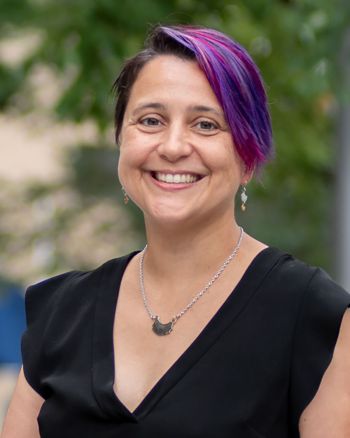
Mandi Pratt-Chapman, PhD ’20, associate center director for patient-centered initiatives and health equity at the George Washington University (GW) Cancer Center and associate professor of medicine at the GW School of Medicine and Health Sciences, was awarded one of three 2021 National Institutes of Health (NIH) Sexual and Gender Minority (SGM) Research Investigator Awards.
Pratt-Chapman, whose research focuses on cancer survivorship, patient navigation, and health equity for lesbian, gay, bisexual, transgender, queer (LGBTQ), and intersex communities, received the 2021 Early-Stage Investigator Award at a virtual awards ceremony. “I’m honored to have received this award as we collectively start to build a greater base of research to inform evidence-based health care practice,” Pratt-Chapman said. “I believe that broad and inclusive research that includes collection of sexual orientation and gender identity data routinely, as well as research that specifically assesses and addresses the needs of historically excluded groups—such as sexual and gender minorities—are critical to improving health outcomes and advancing health equity for lesbian, gay, bisexual, transgender, queer and intersex people.”
In addition to Pratt-Chapman, Devin English, PhD (CCAS ’17), mentored by Sharon Lambert, PhD, professor of clinical/community psychology at the GW Columbian College of Arts and Sciences (CCAS), and dissertation committee member Lisa Bowleg, PhD, professor of applied social psychology at CCAS and director of the DC CFAR Social and Behavioral Sciences Core, received an Early-Stage Investigator Award.
“Dr. English is so deserving of this award. His research, funded by the National Institute of Mental Health, highlights his proficiency with integrating complex critical frameworks such as intersectional discrimination into research to advance empirical knowledge about how interlocking social-structural factors (e.g., racism and heterosexism) constrain Black sexual minority men’s health and well-being. His SGM research represents a refreshing departure from conventional approaches that implicitly blame Black sexual minority men for health inequities such as HIV,” Bowleg said. “I am immensely proud that NIH has recognized his innovative research and expect that he will have many more important contributions to this critical area of research.”
Pratt-Chapman, as an award recipient, was asked to provide a lecture on her NIH-funded research during the ceremony: “TEAM Cancer Care for SGM Patients.”
“Bisexual women have the highest tobacco and alcohol use rates in the U.S., and transgender persons often do not receive organ-driven cancer screening recommendations and care. Health care professionals need to be trained on cancer risk reduction, organ-driven cancer screening, trauma-informed care, and supportive care considerations for the diversity of sexual and gender minorities that comprise 4-10% of the patient population,” Pratt-Chapman said. “Our educational research study, showcased at the NIH event, included a 20-hour training to help cancer care teams improve care for sexual and gender minority patients.”
Pratt-Chapman’s research identified three goals: adapt the existing TEAM health equity training to help multidisciplinary teams create more equitable cancer care systems for SGM patients; evaluate the efforts of organizational cancer teams consisting of four multidisciplinary members; and, through interviews with the teams, identify barriers to new systems and facilitators to help patients overcome those obstacles.
“We saw statistically significant improvements in providers’ learning,” Pratt-Chapman explained. “We have built a new standard for cultural competency training to improve cancer care for sexual and gender minority patients. With motivated learners, we can effect real change to the health care system.”


